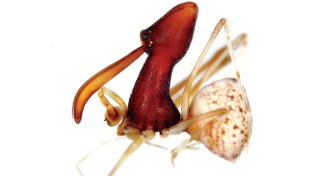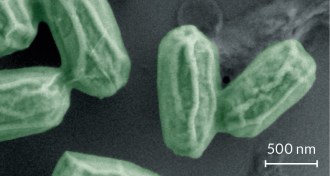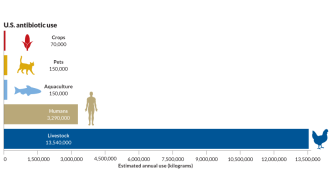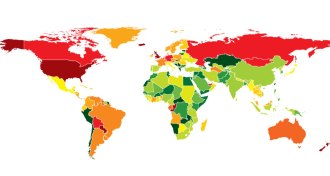Notebook
-
 Psychology
PsychologyHow string quartets stay together
New data tracking millisecond-scale corrections suggests that some ensembles are more autocratic — following one leader —while other musical groups are more democratic, making corrections equally.
-

-

-
 Animals
AnimalsPelican spiders: slow, safe assassins
Spiders, thank goodness, haven’t evolved assassin drones. But the specialized hunters of the family Archaeidae can kill at a distance.
By Susan Milius -
 Microbes
MicrobesPower-packed bacterial spores generate electricity
With mighty bursts of rehydration, bacterial spores offer a new source of renewable energy.
By Beth Mole -
 Agriculture
AgricultureWhere antibiotics go
Of the 51 tons of antibiotics consumed every day in the United States, about 80 percent goes into animal production.
-
 Psychology
PsychologyBeatles reaction puzzles even psychologists
From the February 29, 1964, issue: Psychologists are as puzzled as parents over the explosive effect the Beatles are having on American teen-agers.
-
 Materials Science
Materials ScienceMaking artificial muscles with a spin
Scientists have given ordinary fishing line and sewing thread a new twist. When coiled into tight corkscrews, the fibers can lift loads more than 100 times as heavy as those hefted by human muscles.
By Meghan Rosen -
 Physics
PhysicsLevitating objects with sound
Physicists have levitated millimeter-sized objects. Now, the objects can levitate and move in all directions.
By Andrew Grant -
 Animals
Animals‘Packrat’ is the new term for ‘really organized’
The more eclectic hoarder species segregate pantry from lumber room from junk museum. The result is more orderly than the closets of some human packrats.
By Susan Milius -
 Planetary Science
Planetary ScienceMoon like blue cheese?
The lunar surface turns out to have more grit than scientists thought.
-
 Climate
ClimateBiggest climate warmers
The United States, China, Russia, Brazil, India, Germany and the United Kingdom are responsible for more than 60 percent of the 0.74 degree Celsius rise in global average temperature observed from 1906 to 2005.